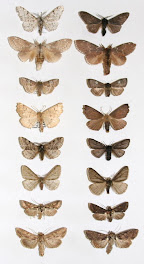The way of life of the Bayaka, a group of hunter-gatherers in the Central African Republic, is being threatened by logging.
From the article:
According to Carroll, the root of the problem is the Central African Republic government's desire to open its forest resources to the international market. Starting in the 1970s, logging has been on a boom-and-bust cycle in the landlocked country.
For example, Carroll said, a logging company will come in and make promises to hire hundreds of workers. This spurs immigration from neighboring countries such as Cameroon.
After a few years the high costs to export the timber cause the logging companies to go belly up, Carroll said, leaving hundreds of immigrants without jobs. To supplement their income, the immigrants fan out into the forest to hunt wild animals to supply the lucrative bush-meat trade.
The Bayaka, Carroll added, are lured to work for the logging companies as guides. This has caused the traditionally seminomadic hunter-gathers to adopt a more settled lifestyle. Among the Bayaka, alcoholism and disease tend to follow this shift.
Basically their way of life is being destroyed by globilization and a group of people are being converted from proud, self sufficient humans to poverty stricken alcoholics. Unfortunately this is not an isolated incident. Happened to the !Kung of the Kalahari, for example.
There is hope though:
In an attempt to reverse the trend of increased logging and bush-meat trade in the Central African Republic and its impacts on the Bayaka, Carroll and WWF helped in 1986 to establish the Dzanga-Sangha Dense Forest Special Reserve and the Dzanga-Ndoki National Park.
The reserve and park encompass more than 5,500 square miles (14,000 square kilometers). Though hunting and logging are prohibited in the park, "in the reserve, hunting and use of the forest is allowed by traditional means," Carroll said.
According to Carroll, WWF has worked with the Bayaka to establish health-related and educational programs. The conservation organization has also helped them find work as forest guides for tourists who want to learn about net hunts and local medicinal plant uses.
But there is still work to be done:
According to Lewis, allowing logging and hunting in reserves adjacent to national parks "legitimizes industry" in the region.
"If that approach is applied across the board in central Africa, it will result in small islands of token landscapes to remind us of what it was once like. The rest will be transformed to logging concessions and hunting [grounds] to provide towns and urban areas with meat," he said.
The entire region ought to be recognized as abundant in forest resources and then managed as a whole, in a sustainable manner, Lewis said.
For example, Lewis said, only logging companies certified as using sustainable practices by the Forest Stewardship Council should be allowed into the region. Traditional hunter-gatherer activities should be unregulated, he added
Globilization would be great if it wasn't so destructive to human dignity and the environment. I don't see how we can contiue to exist by cannibalizing the cultures of our fellow humans.








